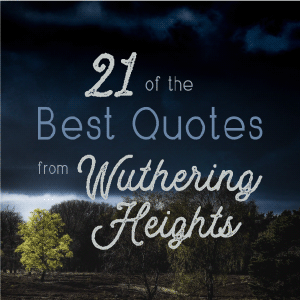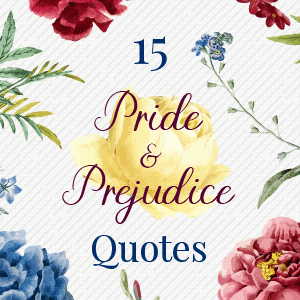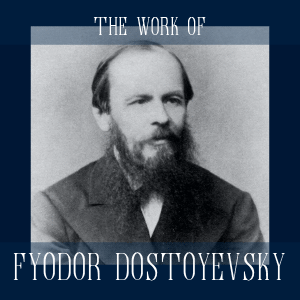21 of the Best Wuthering Heights Quotes

If you’re here to dive into the best Wuthering Heights quotes, you may be surprised to learn that this now-classic novel was far from successful when it was first released. Published in 1847 by English author Emily Brontë (1818-1848), Wuthering Heights was quickly denounced as “strange,” “disagreeable,” and “confused.”
Fast-forward over 150 years…and it’s safe to say that Emily Brontë has the last laugh!
Not only is Wuthering Heights now regarded as a literary masterpiece, it’s also a fan favorite with dozens of film adaptations (and a pretty funny Monty Python sketch, too!). Impressively, a recent poll published by The Guardian found that most readers believe Wuthering Heights is the “Greatest Romance Novel in English Literature.”
What is it about this passionate tale of love and revenge in the Yorkshire moors that inflames the imaginations of so many readers? Perhaps taking a quick peek at some of the best Wuthering Heights quotes will help us understand the enduring power of Emily Brontë’s novel.
Unforgettable Quotes from Wuthering Heights
“He shall never know I love him: and that, not because he’s handsome, but because he’s more myself than I am. Whatever our souls are made out of, his and mine are the same.”
Perhaps the most famous of all Wuthering Heights quotes, this snippet from Chapter 9 has Catherine expressing her deepest feelings for Heathcliff to the housekeeper Nelly Dean.
Despite her obviously powerful feelings towards Heathcliff, Catherine also makes it clear that she’s decided to marry the more “proper” Edgar Linton.
This quotation best reveals Catherine’s unique vision of love. Rather than simply declare she “loves Heathcliff,” Catherine feels the need to say Heathcliff is “more myself than I am.” For Catherine, where “I” ends and “Heathcliff” begins seems to be blurred…and that might not be such a good thing.
Indeed, considering how the rest of this novel turns out, this egoless passion might be something Brontë wants to warn readers about rather than champion. Read in this way, Brontë’s “romantic” novel serves a very un-romantic purpose. This is similar to the cautionary effect Goethe hoped his first novel The Sorrows of Young Werther would have. Goethe’s story of the lovesick Werther was meant to serve as a warning against the potentially destructive nature of human emotions. Unfortunately, many impressionable young men were so moved by Goethe’s novel that the ended up committing suicide in imitation of Werther.
Both of these novels show in vivid detail the violent consequences of unbounded emotions—and yet, ironically, they are both are staples of Romantic literature!
“If all else perished, and he remained, I should still continue to be; and if all else remained, and he were annihilated, the universe would turn to a mighty stranger.”
This is yet another quote from Chapter 9 where Catherine tells Nelly about her feelings for both Heathcliff and Edgar.
Catherine admits that her love for Edgar will most likely ebb and flow, but her love for Heathcliff will remain for all eternity. Shockingly, Catherine admits that if the entire universe were destroyed, yet Heathcliff remained alive, she would still live through him…yeah, that seems to be taking the whole “soul mate” thing to another level!
Some might argue one reason Catherine marries Edgar is because she unconsciously fears what she believes Heathcliff represents in her own psyche. In confronting Heathcliff, Catherine is forced to examine the potentially destructive impulses of human desire. Borrowing a term from Joseph Conrad, we might even say Catherine can’t help but look into her own “Heart of Darkness” when she reflects on Heathcliff’s furious passion and violence.
“I wish I were a girl again, half-savage and hardy, and free.”
It should be obvious by now that Catherine is a pretty conflicted character. In this Wuthering Heights quote from Chapter 12, she looks back longingly on the time before she was introduced to the Lintons and, by extension, to the “civilized” world. Catherine seems to be wondering whether the civilizing influence of Thrushcross Grange prevented her from living a more “authentic” life with Heathcliff.
A question that often comes up when reading Wuthering Heights for the first time is why Catherine would be at all concerned with societal expectations and deny herself a life with Heathcliff. After all, this novel is set in the remotest area of England where society’s laws don’t really apply.
Brontë seems to be posing complicated questions here on the ever-present conflict between our desire for the civilizing influence of culture (the Lintons/Thrushcross Grange) versus our uncontrollable and, oftentimes, self-destructive passions (Heathcliff/the moors)…or, if you want to get Freudian, the superego vs. the id.
“If he loved with all the powers of his puny being, he couldn’t love as much in eighty years as I could in a day.”
Heathcliff makes this comment in Chapter 14 to “prove” his love for Catherine is greater than Edgar Linton’s could ever be. If Heathcliff loves Catherine as much as he does, however, wouldn’t it be nobler to let her go? Indeed, after witnessing all the suffering this “love” causes Heathcliff and those around him, readers might reasonably consider love to be a negative force in Brontë’s novel.
Instead of inspiring selflessness, love drives Heathcliff down a path of obsessive revenge. So, is love portrayed as a kind of sickness in Wuthering Heights? This quote from Shakespeare’s As You Like It might help readers explore this issue in greater depth:
“Love is merely a madness; and, I tell you, deserves
As well a dark house and a whip as madmen do; and
The reason why they are not so punish’d and cured
Is that the lunacy is so ordinary that the whippers
Are in love too.” (III. ii.)“Catherine Earnshaw, may you not rest as long as I am living. You said I killed you–haunt me then. The murdered do haunt their murderers. I believe–I know that ghosts have wandered the earth. Be with me always–take any form–drive me mad. Only do not leave me in this abyss, where I cannot find you! Oh, God! It is unutterable! I cannot live without my life! I cannot live without my soul!”
Heathcliff’s passion is so great that it’s no wonder some readers don’t even view him as a human being. Instead, some literary critics argue Heathcliff represents the power of the untamed, natural world. Some even see Heathcliff as representative of the Satan, perhaps in the sense that Milton characterized the great fallen angel in Paradise Lost.
Interestingly, readers often have the same conflicting emotions towards Milton’s Satan as they do to Heathcliff. On the one hand, we admire their sense of freedom and high ideals; on the flipside, we can clearly see what these characters perceive as a “justifiable quest” leads to great disharmony and destruction.
“I have not broken your heart – you have broken it; and in breaking it, you have broken mine.”
Author Virginia Woolf’s essay on Jane Eyre and Wuthering Heights might help explain this “fused identity” of Catherine and Heathcliff that keeps appearing in this novel.
In contrast to Jane Eyre, Woolf says, “There is no ‘I’ in Wuthering Heights.” Rather than trying to express personal ambitions, Woolf believes Emily Brontë was interested in expressing a more “general conception” than her sister. So, instead of writing “I love” or “I hate,” Emily Brontë’s main characters are really directing their quotes to “the whole human race” or “the eternal powers,” Woolf argues.
This reading of Wuthering Heights could account for why both Catherine and readers have conflicting feelings towards Heathcliff. Although on the surface we are repulsed by many of Heathcliff’s actions, we also feel that he expresses a primal truth we all have bitter experience with: frustrated desire. In this sense, Heathcliff stands for something far larger than his tiny ego; he represents a universal truth in Brontë’s cosmic drama.
“I gave him my heart, and he took and pinched it to death; and flung it back to me. People feel with their hearts, Ellen, and since he has destroyed mine, I have not power to feel for him.”
As readers come across Wuthering Heights quotes like this one from Catherine, it’s understandable to wonder whether Emily Brontë drew on personal romances in her novel.
Interestingly, Emily Brontë never married and lived an extremely secluded life in the Yorkshire moors. All of Wuthering Heights‘ most memorable characters seem to have been born out of Brontë’s fecund imagination.
The only character in Wuthering Heights that might be based on a real person is Catherine’s brother Hindley. Biographers believe Brontë partially based Hindley on her own brother Branwell. Like Branwell, Hindley descends into alcoholism later in the novel. The reasons for Hindley’s descent into drink, however, differs from Branwell’s. Hindley seeks consolation in booze after his wife Frances passes away, but Branwell seems to have been involved a steamy relationship with a married woman.
“I am now quite cured of seeking pleasure in society, be it country or town. A sensible man ought to find sufficient company in himself.”
Although we often focus on Heathcliff and Catherine when discussing Wuthering Heights, it’s important to keep in mind that Emily Brontë’s main narrator is Lockwood. It might seem curious at first why Brontë chose to frame her narrative in such a way, but one theory is that Brontë uses Lockwood as a foil to Heathcliff.
In the quote above, Lockwood calls himself a “sensible man” who enjoys the splendors of solitude…but at almost every opportunity Lockwood awkwardly tries to become the center of attention! Unwittingly, Lockwood brings the pretensions of “society” with him into the moors. Heathcliff probably has more experience with true solitude than Lockwood has ever experienced.
Also, unlike Heathcliff’s strong passions, Lockwood has some serious issues with emotional repression. Remember that Lockwood admits to shrinking “icily into [himself], like a snail” when he receives advances from a young woman in a seaside town. So, while Heathcliff might be overzealous in expressing his passions, Lockwood’s passions are, well, all locked up!
“I’m wearying to escape into that glorious world, and to be always there: not seeing it dimly through tears, and yearning for it through the walls of an aching heart: but really with it, and in it.”
Shortly before her death, Catherine confides in Nelly her hope to transcend into a “glorious world.” So, does this “glorious world” refer to salvation in heaven?
Wuthering Heights can’t really be considered a Christian text, but it certainly has spiritual and supernatural elements. We also know from previous quotes that Catherine has a deep awareness of the all-pervading power of nature, which are best represented by Heathcliff and the moors.
Perhaps taking a peek at Virginia Woolf’s essay might help us understand what Brontë is getting at here. Woolf writes that, “It is this suggestion of power underlying the apparitions of human nature and lifting them up into the presence of greatness that gives [Wuthering Heights] its huge stature among other novels.”
There seems to be some kind of “power,” or perhaps an apprehension of eternity, that Catherine catches glimpses of throughout the novel. Brontë never states her metaphysics clearly in Wuthering Heights, but it’s highly likely this novel’s enduring power has something to do with its complex ideas on the mysteriousness of nature and the power of man’s Being.
“It was not the thorn bending to the honeysuckles, but the honeysuckles embracing the thorn.”
In this quote from Chapter 10, the “thorn” refers to Catherine and the “honeysuckle” to the civilizing influence of Thrushcross Grange. The Lintons are able to transform this wild “thorn” in the moors into a proper lady by slowly introducing her to the refinements of society. As we’ve seen in other quotes, however, Catherine has reservations about the benefits of leaving the moors after entering the Lintons’ society.
Since the moors play such a critical role in the mood of Wuthering Heights, it’s a good idea to look up a few images of the moors in Haworth, Yorkshire, before reading this text.
Emily Brontë spent most of her life in Haworth, so it’s highly likely this area served as inspiration for the setting in Wuthering Heights. Of course, if you happen to be in the UK, you could always stop by this incredible area for a Wuthering Heights field trip.
“I have dreamt in my life, dreams that have stayed with me ever after, and changed my ideas; they have gone through and through me, like wine through water, and altered the color of my mind. And this is one: I’m going to tell it – but take care not to smile at any part of it.”
Although we often consider Wuthering Heights a romance, it’s impossible to ignore the many Gothic features Emily Brontë employs. One such Gothic element is the heavy use of dreams throughout the text.
In the Wuthering Heights quote above, Catherine describes dreams that have had such a deep impression on her psyche that they’ve “altered the color of [her] mind.” Catherine seems to be especially sensitive to this more mysterious region of the psyche. Unfortunately for Catherine, this sensitivity also leads to her early death due to a “brain fever.”
Perhaps a question Brontë is asking here how far we should go in analyzing our dreams. Are dreams really the gateway to the subconscious? If so, how do we retrieve the wisdom of these nightly visions without completely losing our sanity? Unfortunately, we’re still struggling to accurately answer these questions hundreds of years after Wuthering Heights‘ publication.
“Catherine Earnshaw, may you not rest as long as I am living. You said I killed you – haunt me then. The murdered do haunt their murderers. I believe – I know that ghosts have wandered the earth. Be with me always – take any form – drive me mad. Only do not leave me in this abyss, where I cannot find you! Oh, God! It is unutterable! I cannot live without my life! I cannot live without my soul!”
If Heathcliff can’t be Catherine’s husband, then he’d rather be her murderer and allow Catherine’s ghost to haunt him for eternity. Yeah…is there really any clearer illustration of how “love” for another human could become so perverted? Perhaps.
You see, after Catherine’s death, Heathcliff becomes obsessed with her dead body. Some have suggested there’s a tinge of necrophilia here, but Heathcliff only admits to Nelly that he feels Catherine’s ghostly presence and derives comfort from seeing her body.
Whether Catherine’s ghost is real or not, however, is something every reader of Wuthering Heights has to decide for him/herself.
“A person who has not done one half his day’s work by ten o’clock, runs a chance of leaving the other half undone.”
Nelly Dean chastises Lockwood with this quote at the end of Chapter 7. Lockwood wants to hear more about Wuthering Heights’ past, but Nelly advises the new guest to get a good night’s rest so he can complete a full day of work tomorrow.
This is a good example of Nelly Dean’s more conservative, God-fearing character. It’s critical for readers to keep in mind that the whole Earnshaw-Linton story is filtered through Nelly Dean’s value system. Readers might also call into question Nelly’s lack of responsiveness to some of the more violent acts she witnesses during the course of the novel. Some critics have gone so far as to call Nelly Dean the “villain” of Wuthering Heights.
Is Brontë criticizing traditional piety through the characterization of Nelly Dean?
“I have to remind myself to breathe – almost to remind my heart to beat!”
Although Heathcliff says he is not afraid of death, he also admits that he “cannot continue in this condition.” Heathcliff then makes the above confession to Nelly Dean, adding that he wishes the “long fight” of his life were over.
Thankfully, it’s physically impossible to forget to breathe or beat our hearts because they are a part of the autonomic nervous system. When we experience chronic or acute stress, however, it’s likely we will feel as if we’ve lost control of our breathing, digestion, and heart rate.
Interestingly, recent scientific studies show people who practice daily breath meditation have significantly lower anxiety rates than those who don’t. In addition to helping you relax, meditation could boost your concentration and memory skills, which are sure to help you tackle all those classic novels on your bucket list!
“A wild, wicked slip she was.”
Let’s be honest, this Wuthering Heights quote from Chapter 5 isn’t all that memorable. Indeed, it’s just a description of Catherine as a young girl. The only reason why this phrase deserves extra attention is because it’s one of the most frequently misattributed quotes in Wuthering Heights.
If you’ve gone onto popular websites looking for quotes from Wuthering Heights, then you’ve probably run across the phrase, “She burned too bright for this world.” People often attribute this quote to Brontë’s Wuthering Heights, but scholars cannot find this sentence in the text. The only phrase that comes close to this description of Catherine is the quote from Chapter 5 listed above.
This just goes to show you can’t trust everything you read on the Internet!
“Time brought resignation, and a melancholy sweeter than common joy.”
Found in Chapter 17, this quote describes Edgar Linton shortly after the death of Catherine. At first glance, it seems like this sentence is nonsensical; melancholy and joy are polar opposites, right? Well, recent science shows a healthy dose of pessimism might actually stave off depression.
Indeed, psychological studies have shown that people who are “depressed” often see the world more objectively than their optimistic counterparts. As with everything else in life, of course, balance is key. If we get overly pessimistic and cynical, then it could lead to excessive self-loathing and self-harm. On the flipside, we can’t come to grips with reality if we wear rose-tinted glasses all the time.
“Treachery and violence are spears pointed at both ends; they wound those who resort to them worse than their enemies.”
Isabella Linton makes this moral proclamation in Chapter 17 when arguing with Hindley. Unfortunately, so many Wuthering Heights characters (and people in the real world, for that matter!) fail to heed these words and instead cause great suffering for themselves and those they love.
Although Elizabeth Brontë didn’t have access to ancient Buddhist texts like the Dharmapada, the above quote bears a striking resemblance to the famous verse 125:
Who offends the inoffensive,
the innocent and blameless one,
upon that fool does evil fall
as fine dust flung against the wind.“Honest people don’t hide their deeds.”
Many of Nelly’s statements are overly simplistic. While they may appear relatively true on the surface, they ignore a great deal of nuance.
How often have we heard of or seen honest people with good intentions hiding their deeds? For instance, think of people who donate anonymously to charity. Yes, it makes sense people up to no good would want to hide their deeds, but that doesn’t mean honest people don’t hide good deeds every now and again.
Speaking of “hiding one’s deeds,” did you know Emily Brontë published Wuthering Heights under the penname Ellis Bell?
“I lingered round them, under that benign sky: watched the moths fluttering among the heath and harebells, listened to the soft wind breathing through the grass, and wondered how any one could ever imagine unquiet slumbers for the sleepers in that quiet earth.”
These are Lockwood’s final observations after he passes by the graves of Catherine, Heathcliff, and Edgar. Just like the start of the novel, these closing words have a kind of nightmarish quality that begs the question: how much of what we’ve heard was reality and how much fantasy?
Although these words mark the end of Emily Brontë’s literary career, one letter suggests she had plans for another novel. Thomas Cautley Newby, a London publisher, wrote to “Ellis Bell” in 1847: “I am much obliged by your kind note & shall have great pleasure in making arrangements for your next novel.” Sadly, we don’t know any of the details of what this second work might’ve been about.
Fun fact: in addition to Wuthering Heights, Thomas Cautley Newby is responsible for publishing the major novels of Emily’s sister Anne Brontë: Agnes Grey and The Tenant of Wildfell Hall.
“I was frightened, and Mrs. Earnshaw was ready to fling it out of doors: she did fly up, asking how he could fashion to bring that gipsy brat into the house, when they had their own bairns to feed and fend for?”
A question readers often have when reading Wuthering Heights is why Mr. Earnshaw decided to bring Heathcliff from Liverpool to the moors. Was it just out of Christian charity? Or, perhaps, is there something more sinister going on here?
Some critics believe Heathcliff could be Mr. Earnshaw’s child from an affair. That certainly would explain why Mrs. Earnshaw has such a violent reaction to Heathcliff!
Of course, this also brings up the icky issue many readers would rather avoid: the intimations of incest. Readers are understandably put off by the idea that Catherine and Heathcliff grow up like brother and sister and later want to become lovers. Some critics have gone so far as to suggest that Emily Brontë might be sublimating taboo sexual feelings for her brother Branwell through Wuthering Heights. Of course, these theories became more fashionable in the 20th century with the emergence of Freudian psychoanalysis.
Like it or not, these questions remain unanswered in the text, which has led to many uncomfortable discussions in English literature classes.
“It is hard to forgive, and to look at those eyes, and feel those wasted hands,’ he answered. ‘Kiss me again; and don’t let me see your eyes! I forgive what you have done to me. I love my murderer—but yours! How can I?”
Forgiveness is rather difficult to find in Wuthering Heights. Sure, Heathcliff says he forgives Catherine in this quote, but his actions throughout the novel tell quite a different story. It seems Heathcliff, like many other characters, is motivated more by vengeance than selfless love.
One of the only rays of true hope in Wuthering Heights is the relationship between young Cathy and Hareton Earnshaw. Both of these children bear certain physical and psychological traits of their parents, but they are able to transcend their past. Rather than forming a relationship based on vengeance, Cathy and Hareton show the possibility for mutual respect and compassionate understanding. With this redemptive ending, Brontë suggests that our actions define our destiny rather than the decisions made by our ancestors.
As we mentioned at the start, when it was first released, Wuthering Heights was far from a critical darling.
One critic named James Lorimer went so far as to say, “Here all the faults of Jane Eyre (by Charlotte Brontë) are magnified a thousand fold, and the only consolation which we have in reflecting upon it is that it will never be generally read.” Even Emily’s more successful sister Charlotte felt the need to apologize for the characterization of Heathcliff in her preface to the novel’s 1850 edition.
Despite the critical poor reception (which unfortunately continued past Emily’s own death), Emily Brontë’s only-published work has clearly found its way into readers’ hearts and minds. It may be dark, tragic, and indeed “strange,” but characters, stories, and quotes from Wuthering Heights still resonate with readers around the world today.
What do you think? Which of these unforgettable Wuthering Heights quotes has been most impactful to you?
If you want to know more about the complicated web of characters in this novel, check out our Wuthering Heights family tree. Warning, though, spoilers ahead!





Leave a Reply
Be the First to Comment!